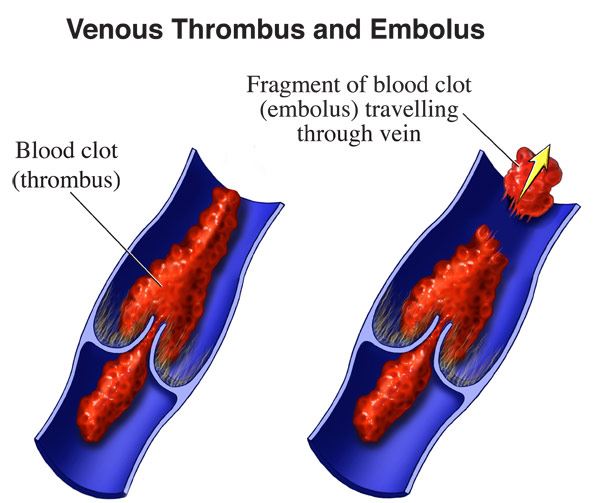Blood Clots
A blood clot is a clump of blood that has changed from a liquid to a gel-like or semisolid state. Clotting is a necessary process that can prevent you from losing too much blood in certain instances, such as when you’re injured or cut. Blood clots usually dissolve on their own. If not, the clots can potentially lead to life-threatening situations. There are two main types of blood clots: thrombus (clot does not move) and embolus (clot breaks loose and moves). If the clot is immobile, it generally won’t harm you. If the clot breaks loose, it can lead to pulmonary embolism (PE) and/or deep vein thrombosis (DVT). Both life-threatening situations.

Medical Illustration Copyright © 2019 Nucleus Medical Media, All rights reserved.
If you are concerned about blood clots, talk to a doctor right away.
Need help finding a specialist? Request an appointment and we will connect you to an RWJBarnabas Health cardiovascular expert.
Causes of Blood Clots
Blood clots form when there is damage to the lining of a blood vessel, either an artery or a vein. The damage may be obvious, such as a cut or laceration. However, other conditions, traits or habits may also play a role in raising your risk. These conditions are known as risk factors. They include non-modifiable and modifiable risk factors.
Non-Modifiable Risk Factors: These factors are irreversible and cannot be changed. The more of these risk factors you have, the greater your chance of developing blood clots.
- The risk is greater after 40 years of age.
- Family history of genetics
- Pregnancy
Modifiable Risk Factors: These factors can be modified, treated or controlled through medications or lifestyle changes.
- Long history of cigarette smoking and/or drug abuse.
- Obesity or having a body mass index “BMI” of 30 or greater.
Other conditions that contribute to the development of blood clots:
- Sitting for long periods of time, especially in a plane or a car.
- Birth control pills or hormone replacement therapy after menopause.
- Male hormones such as testosterone.
- Malignancy “cancerous” spread.
- Certain blood disorders (anemia, hemophilia, leukemia, lymphoma, myeloma, among others).
- Coronary artery disease
- Inflammatory bowel disease: A group of disorders that cause chronic inflammation of your digestive tract.
- Injury to a vein that occurs from breaking a bone, damaging a muscle, or during major surgery.
- Certain cancer types (pancreatic, lung, multiple myeloma).
- Certain infections (HIV/AIDS, hepatitis C, Lyme disease).
Symptoms of Blood Clots
Symptoms of blood clots depend on their location in the body. Some blood clots produce no symptoms until they rupture or become dislodged and travel through the circulatory system to other sites. Common symptoms of blood clots include the following:
- Blood in the stool
- Chest pain
- Fainting
- Loss of speech
- Nausea
- Rapid pulse
- Shortness of breath
Diagnosis of Blood Clots
To diagnose blood clots, your doctor will ask you about your symptoms. You'll also have a physical exam so that your doctor can check for areas of swelling, tenderness or discoloration on your skin. For some people, blood clots may not be diagnosed until after they receive emergency treatment. Otherwise, your doctor will recommend one or more of the following diagnostic tests and procedures:
- Blood tests
- Ultrasound
- Computed tomography (CT scan)
- Magnetic resonance imaging (MRI)
- Perfusion lung scan
Treatment of Blood Clots
Blood clot treatment is aimed at preventing the clot from getting bigger and preventing it from breaking loose and causing a pulmonary embolism. Treatment options include lifestyle changes, medications, and surgical procedures.
Lifestyle Changes
- Avoid sitting for prolonged periods of time.
- Eat a heart-healthy diet.
- Watch for signs of excessive bleeding.
- Wear compression stockings to help prevent blood clots in the legs.
- If you're overweight, talk to your doctor about weight loss options.
- Make and keep appointments to see your doctor for routine checkups and follow-up tests.
Medications
- Thrombolytic therapy is the administration of drugs called “lytics” or “clot busters” that will help break up or dissolve blood clots.
Medical and Surgical Procedures
At RWJBarnabas Health, we are the destination for ensuring your heart and vascular health. Connect with one of our cardiovascular specialists.
